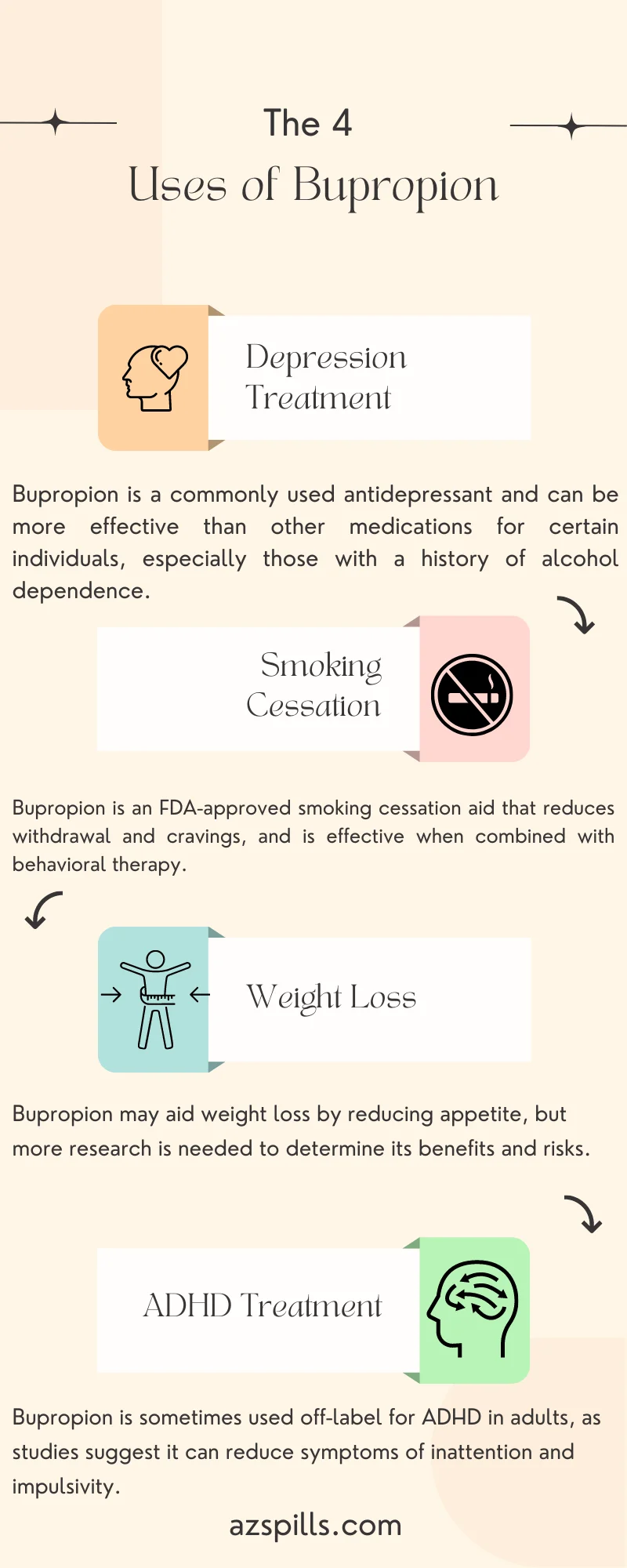Bupropion is a medication that is commonly used to treat depression and aid in smoking cessation. It is also sometimes prescribed to help with weight loss and attention deficit hyperactivity disorder (ADHD). In this response, we will explore the different uses of bupropion in detail, as well as the mechanisms by which it works and the potential benefits and side effects of taking this medication.
Mechanism of Action
Bupropion is believed to work by increasing the levels of the neurotransmitters norepinephrine and dopamine in the brain. Norepinephrine is involved in regulating mood, while dopamine is associated with feelings of pleasure and reward. By increasing the levels of these neurotransmitters, bupropion can help improve mood and reduce cravings for nicotine.

Uses of Bupropion
Depression Treatment: Bupropion is commonly used as an antidepressant, either on its own or in combination with other medications. Studies have shown that bupropion can be effective in treating major depressive disorder, with some research indicating that it may be more effective than other antidepressants for certain individuals. For example, one study found that bupropion was more effective than sertraline (another commonly prescribed antidepressant) in treating depression in patients with a history of alcohol dependence.
Smoking Cessation: Bupropion is also approved by the U.S. Food and Drug Administration (FDA) as a smoking cessation aid. It can help reduce the symptoms of nicotine withdrawal and cravings for cigarettes, making it easier for individuals to quit smoking. Studies have shown that bupropion can be effective in helping people quit smoking, particularly when used in combination with behavioral therapy.
Weight Loss: Bupropion has also been studied as a potential aid for weight loss. While it is not approved by the FDA for this use, some research has found that bupropion may help reduce appetite and promote weight loss in some individuals. However, more research is needed to fully understand the potential benefits and risks of using bupropion for weight loss.
ADHD Treatment: Bupropion is sometimes used as an off-label treatment for ADHD, particularly in adults. While it is not approved by the FDA for this use, some studies have found that bupropion can be effective in reducing symptoms of ADHD, such as inattention and impulsivity. However, more research is needed to determine the safety and efficacy of bupropion for this use.
Potential Benefits and Side Effects
Like all medications, bupropion can have both potential benefits and side effects. In terms of benefits, bupropion has been shown to be effective in treating depression, aiding in smoking cessation, and potentially promoting weight loss. It may also have some benefit in treating ADHD, although more research is needed in this area.
However, bupropion can also cause a range of side effects, including dry mouth, headache, nausea, insomnia, and agitation. In rare cases, it can also cause more serious side effects such as seizures or suicidal thoughts. As with any medication, it is important to talk to a doctor or healthcare provider about the potential benefits and risks of taking bupropion.
Conclusion
Overall, bupropion is a medication that can be effective in treating depression, aiding in smoking cessation, and potentially promoting weight loss and reducing symptoms of ADHD. However, like all medications, it can have potential side effects and should only be taken under the guidance of a doctor or healthcare provider. If you are considering taking bupropion, it is important to talk to your doctor about the potential benefits and risks, and to work with them to determine the best course of treatment for your individual needs.
Comments are closed.